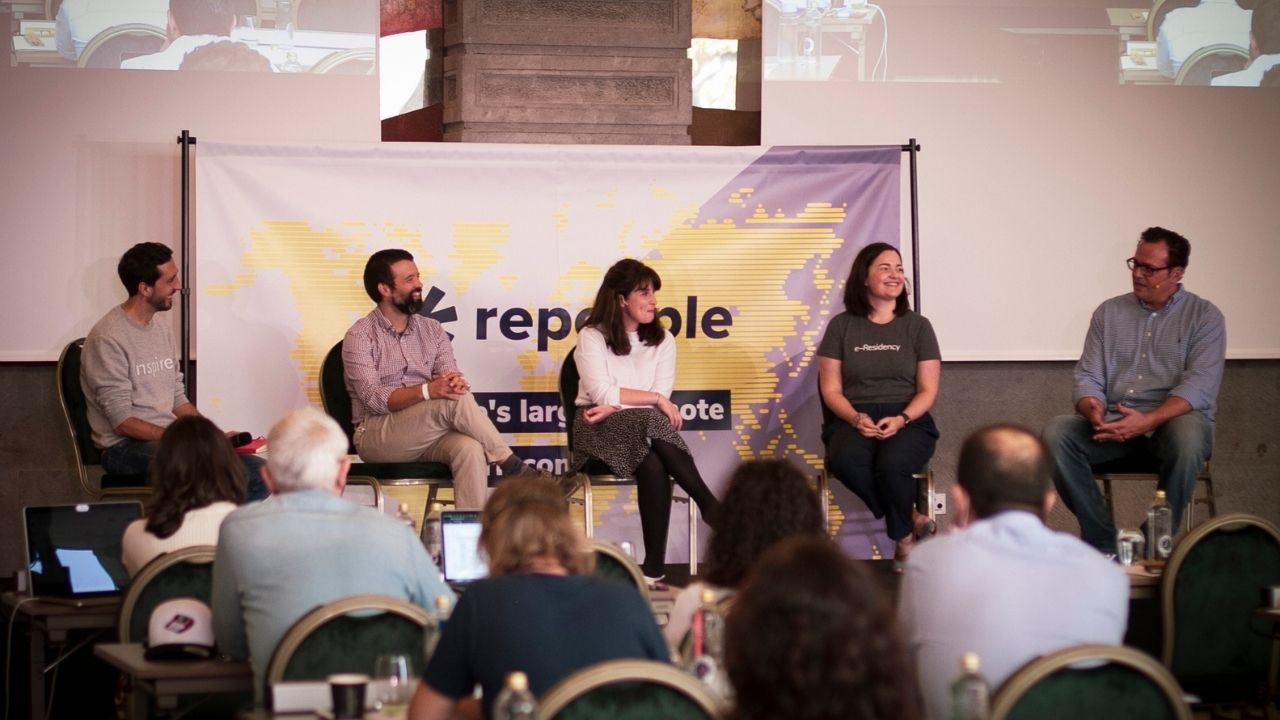- Europe’s largest remote work conference, repeople, recently took place in the Canary Islands.
- One panel focused on the question: Can virtual work really create a positive socio-economic impact worldwide?
- Grow Remote’s Tracy Keogh led the response, and explained how their approach is bringing digital development and brighter futures to rural locations.
The sixth edition of repeople, Europe’s largest remote work conference, recently took place in the Canary Islands.
Around 80 speakers descended on the islands of Gran Canaria, Tenerife, and La Palma for the co-located conference, which covered a vast range of topics ranging from tax structures for remote workers, to virtual teams leadership, and opportunities for tourism.
Home to more than 100 coworking and coliving spaces, the Canary Islands have become one of the most important remote worker and digital nomad destinations in the world. It’s no surprise that it has also become a favorite location for company retreats as well as a meeting point for distributed companies and teleworkers.
Matthew Hirtes attended the conference to learn what it’s like to work remotely in a sub-tropical paradise. In this article, Matthew summarizes the panel featuring Grow Remote’s Tracy Keogh, who spoke about how remote work and digital development can make a positive socio-economic impact in rural Ireland.
Grow Remote’s Tracy Keogh Helps Digital Development Come to the Aid of the Irish Countryside
In the plush surroundings of Las Palmas de Gran Canaria’s five-star Santa Catalina, a Royal Hideaway Hotel, co-founder of Grow Remote, Tracy Keogh is joined on stage by Hannah Brown, head of content at the e-Residency of Estonia, repeople CEO & founder Nacho Rodriguez, and Joao Mendes, founder of No Footprint Consulting.
The question put to them by energetic and playful host David Blay Tapia is an intriguing one. Can virtual work really create a positive socio-economic impact worldwide?
Grow Remote developed from a WhatsApp group into a non-profit organization. As Tracy recalls, “We wondered why we had never heard about GitLab, Automattic, and others who would employ us as a permanent full-time employee (as opposed to offering us freelance work) regardless of a location.” This panel showed the diversity of teleworking with Hannah explaining how entrepreneurs can set up an online community in Estonia in a single day.
But remote work is about protecting traditions as much as embracing modern change.
Nacho Rodriguez wants the Canary Islands to retain local talent as much as attract foreign digital nomads. “La Palma is growing old,” he warns. “There is no university. The young leave and never come back. The two big cities on the islands concentrate all the work. Why not base yourself in Gran Canaria’s beautiful Tejeda? You don’t want to commute. The road is really windy.”
Tracy feels the same about rural Ireland. She talks about Google’s carbon-neutral building and wonders if that’s really more energy efficient than 600 people working in their own homes.
Tracy references an early event in Limerick where locals’ faces “lit up” when they were told they could get jobs with parental and sick leave and not have to commute to a big city to do so.
There’s a commitment to her roots that’s the very antithesis to Starbuck’s clustering, which sees one of their coffee houses on every corner of a street to kill off ma-and-pa businesses. Tracy plays the fiddle, having grown up in a bedroom above the space where bands played the regular trad sessions at Keogh’s Bar and Restaurant (signature dish Seafood Chowder). She’s a fan of the classic pint of Guinness and Tato crisps combo.
Tracy was exposed to the worrying economic predicament of rural Ireland when she was employed by the Bank of Ireland. “I was working with local communities all over Ireland,” explains Tracy. ”There were a few trends, we were all hearing about remote work but not seeing impact, we were building coworking spaces that weren’t filling, and in general we were doing a lot of work but not addressing the fundamental issue of lack of jobs.”
“That was something that was always up to government agencies, but remote work has democratised that. Now anyone can create employment locally. With more jobs and disposable income, our high streets can come back and we can fund local projects better.”
The Irish government has acknowledged the potential of Grow Remote, and funding them 500,000€ led to the hiring of the non-profit’s first team. They now have 10 full-time employees.
Four years on, Tracy is glad to see Grow Remote as focused on its mission as it was at the very beginning. Long term, she is bold in her desire that “no child in Ireland will understand how we could have ever needed to go to Dublin to get a decent career.”
The people who benefit from Grow Remote’s no-commute philosophy can give back. Many are volunteers. They coach kids to develop skills in traditional Irish sports. They grow their own fruits and vegetables which they sell at farmers’ markets. It’s like a wand sprinkling stardust. Or what Tracy refers to as a “cycle of never-ending goodness.”
There is a realization that Grow Remote helps to supply what is increasingly being demanded. Once one person starts working remotely, they tell a friend who wants to do the same. CEOs of leading Irish enterprises are noticing this.
As Tracy is at pains to point out, “It’s not a pyramid scheme.” Grow Remote is transparent. They publicize their findings. Tracy and her team are planning free training sessions for those looking to work remote and companies who want to go remote. If there are ones who want to remain with a main office, that’s good as well. It’s all about finding balance in the modern workplace.
Now that’s how to make a positive socio-economic impact.
Matthew Hirtes, Dreams Abroad writer.



 Dr. Gleb Tsipursky – The Office Whisperer
Dr. Gleb Tsipursky – The Office Whisperer Nirit Cohen – WorkFutures
Nirit Cohen – WorkFutures Angela Howard – Culture Expert
Angela Howard – Culture Expert Drew Jones – Design & Innovation
Drew Jones – Design & Innovation Jonathan Price – CRE & Flex Expert
Jonathan Price – CRE & Flex Expert












